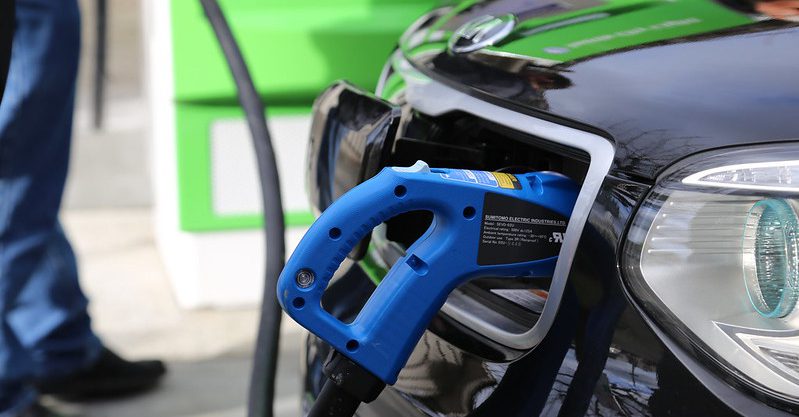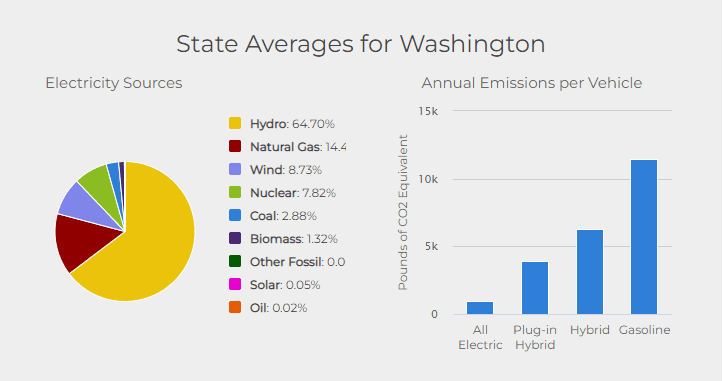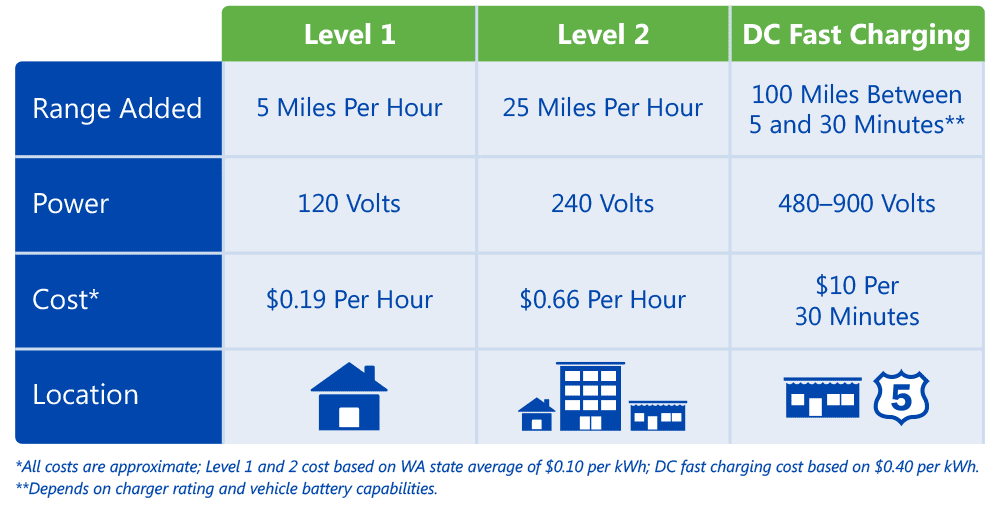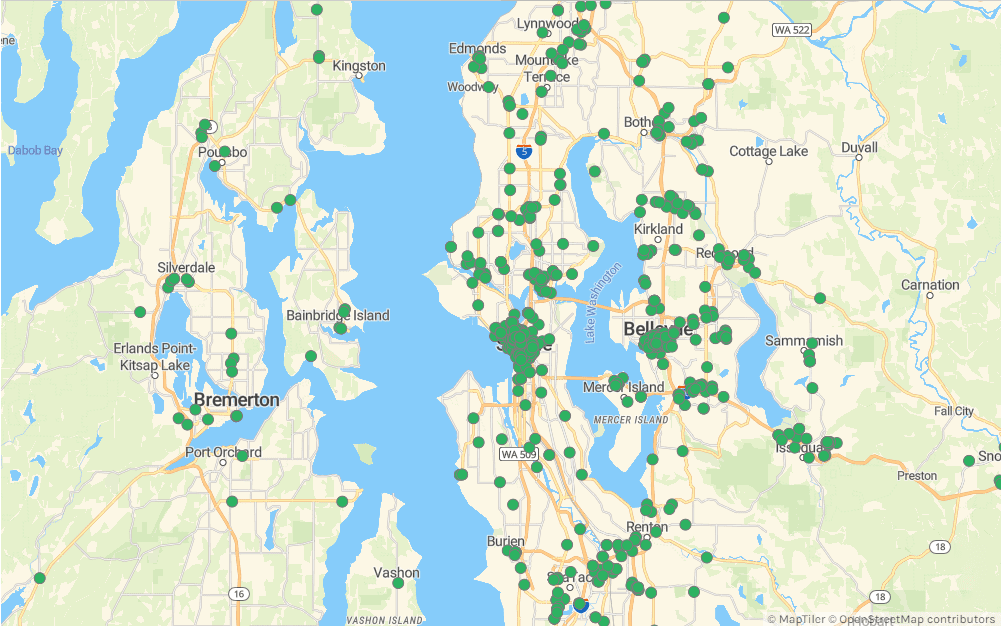
In our 2021 customer satisfaction survey, six in ten customers told us they don’t currently own or lease an electric vehicle but are interested in getting one. To help you make informed decisions about electric vehicles (EVs), we have compiled a list of common questions and facts about this clean, green mode of transportation.
Q: Why should I switch from a gas-powered vehicle to an electric vehicle?
A: Environmental and public health benefits
The biggest difference between EVs and gas-powered vehicles is the pollutants that each emits into the environment. Carbon emissions, or greenhouse gas emissions, are the main pollutant and contributor to global climate change. In the Seattle area, 60% of our carbon emissions come from road transportation.
EVs charging from City Light’s electricity will produce little to no carbon emissions. Since City Light’s power is carbon neutral, electric vehicles in our area have some of the lowest emissions of any vehicles in the country. According to the US Department of Energy’s data for Washington, the all-in yearly emissions put out by operating an EV in our state is 940 pounds, compared to the 11,435 pounds produced by operating a gasoline vehicle.
Additionally, gas- and diesel- powered cars put out additional pollution like particulate matter, nitrogen and sulfur oxides, and volatile-organic compounds, all of which contribute to negative public health impacts like breathing troubles, heart and lung disease, stroke, and premature death. EVs produce zero tailpipe emissions, while conventional gasoline vehicles produce 20 pounds of pollution per gallon of gas burned (Western WA Clean Cities, “Welcome to the EVolution”, p. 22).

Reduced costs over the lifetime of the car
Cost is often named as the number one barrier to buying electric vehicles. While up-front costs may currently be higher than gas-powered vehicles on the market, EV owners will spend less on maintenance and fuel throughout the lifetime of the car. Without an engine that burns gas, EVs don’t need oil changes, spark plugs, air filters or mufflers.
Fueling up is also cheaper with Seattle City Light’s affordable electricity rates. For a 2022 Nissan Leaf, it would cost approximately $5.23 to completely fuel up (for 149 miles of range) at home using your residential energy services from City Light. The Department of Energy has a nifty eGallon tool to see how much cheaper it is to fuel up on electricity versus gasoline.
Q: How does charging work? Can I do it at home? Will I need special equipment?
A: There are currently 3 levels of EV charging available, each with different charging speeds and equipment.

At-home charging uses a Level 1 or 2 charger. Level 1 charging uses a standard 120-volt outlet in your wall. For faster Level 2 charging, you can install a home charger using the same type of 240-volt outlet that powers your laundry dryer or electric oven. Purchasing and installing Level 2 charging equipment in your home may cost $500 to $1,500 for most consumers. By charging your car at home overnight, you can leave home each day with a “full tank.”
For topping off on the road, there are a number of DC fast chargers in public locations like shopping center parking lots, city parks, and more. City Light has 17 publicly available EV fast chargers located at seven different sites across our service area.
Q: I know I can count on my gas-powered vehicle to get me where I need to go, and I know that there are always gas stations around when I need them. How do EVs compare? Are they as reliable as gas cars? What if I get stranded without a charging station nearby?
A: Americans drive an average of 40 miles per day, which is easily covered by the battery range of today’s EVs. EV technology has come a long way in its short lifetime and continues to improve, resulting in longer battery life and more advanced charging equipment.
Simultaneously, the increased adoption of EVs, accelerated in some cases by city, state, or federal mandates, has resulted in an ever-growing network of public charging stations. In fact, Washington State is a key part of the “West Coast Electric Highway,” which provides charging facilities along 1,350 miles of I-5 from Canada to Mexico. There are apps like PlugShare to help EV drivers locate charging stations nearby.

Q: While the idea of an EV sounds nice, I can’t afford a Tesla. Are there more cost-effective electric vehicles in the market? Where can I find more information about the EVs that are available?
A: Every year, more and more auto manufacturers are putting EVs on the market, including BMW, Chevrolet, Ford, Honda, Hyundai, Kia, Toyota, Nissan, Mitsubishi, Volkswagen, and Tesla. Because EVs have now been in the market for several years, there are also plenty of used EVs for sale. PlugStar is a great online resource to help you explore EVs available for sale that will meet your needs.
Additionally, there are some federal and Washington State incentives to make buying an EV more affordable. For example, taxpayers may be eligible for a $7,500 federal tax credit for the first-time purchase of an electric car. Washington State also offers a sales and use tax exemption for new or used clean alternative fuel and certain plug-in hybrid vehicles.
To learn more about EVs, visit our website.
Sources: PlugStar, Puget Sound Clean Air Agency, US Department of Energy’s Alternative Fuels Data Center, US Department of Energy’s FuelEconomy.gov, US Department of Energy’s eGallon Tool, Washington State Department of Revenue, West Coast Green Highway, Western WA Clean Cities, “Welcome to the EVolution”